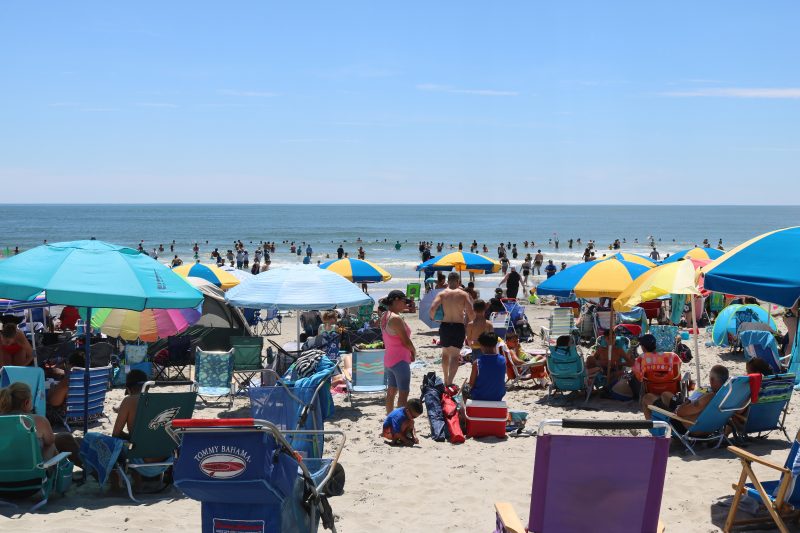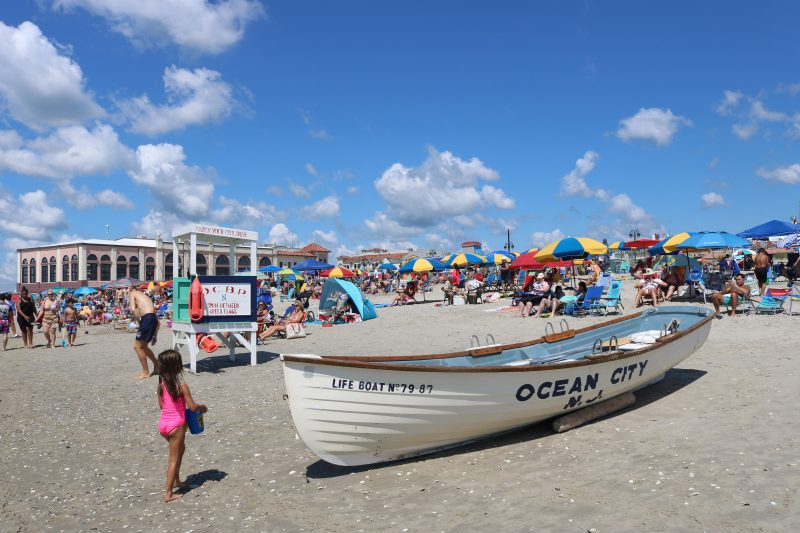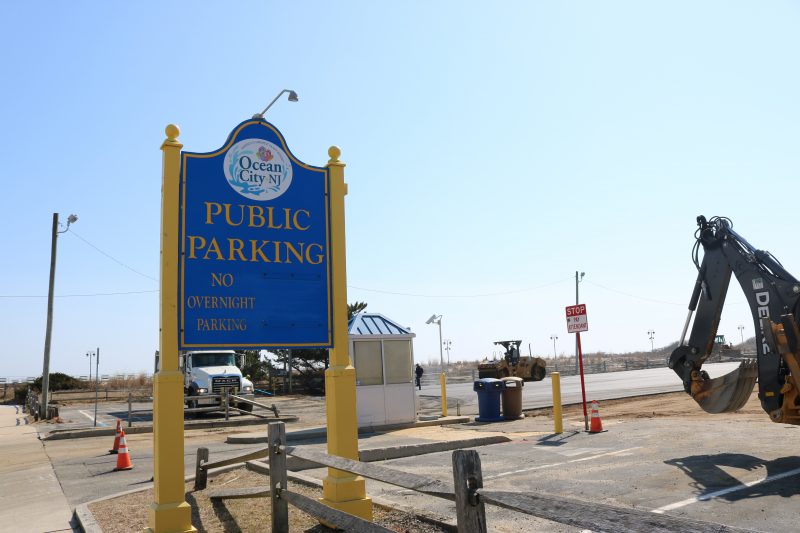The summer tourism season is here and soon beaches will be filled like this one on Ninth Street in 2022.
 By DONALD WITTKOWSKI
Could surging gas prices be to blame? Or could it be the sting of inflation overall? Or could there be some other factor this summer that is driving down revenue in two vital areas of Ocean City’s tourism industry?
For now, Ocean City officials are not speculating on the cause, but the latest figures show that beach tag sales and parking revenue for 2022 have dipped compared to the banner summer of 2021 – a year boosted by the end of COVID-19 restrictions.
“I think 2021 is a tough measuring stick to live up to,” said Frank Donato, the city’s chief financial officer.
Donato noted it is simply too early to tell whether the record-high gas prices that climbed above $5 per gallon in June or inflation hitting a new 40-year high this summer are cutting into Ocean City’s vacation market.
“I don’t know if anyone can say for certain,” he said.
Beach tag sales and parking revenue are considered key economic indicators of the strength of the summer tourism season.
Figures compiled through July 31 show that beach tag revenue has totaled nearly $3.5 million so far this summer, compared to about $3.8 million in the same period in 2021.
On the parking side, total revenue came in at about $1.85 million through July 31, compared to about $2.2 million for the same period last year.
“Not great news. Not bad news. OK news,” is how City Business Administrator George Savastano characterized the 2022 revenue figures up to this point.
Overall, he believes that the beach tag sales and parking revenue are “promising.”
“We’re not done yet. Hopefully, we’ll have a strong remainder of the (summer) season and a strong fall,” Savastano said while reporting on the revenue figures during a City Council meeting Thursday night.
By DONALD WITTKOWSKI
Could surging gas prices be to blame? Or could it be the sting of inflation overall? Or could there be some other factor this summer that is driving down revenue in two vital areas of Ocean City’s tourism industry?
For now, Ocean City officials are not speculating on the cause, but the latest figures show that beach tag sales and parking revenue for 2022 have dipped compared to the banner summer of 2021 – a year boosted by the end of COVID-19 restrictions.
“I think 2021 is a tough measuring stick to live up to,” said Frank Donato, the city’s chief financial officer.
Donato noted it is simply too early to tell whether the record-high gas prices that climbed above $5 per gallon in June or inflation hitting a new 40-year high this summer are cutting into Ocean City’s vacation market.
“I don’t know if anyone can say for certain,” he said.
Beach tag sales and parking revenue are considered key economic indicators of the strength of the summer tourism season.
Figures compiled through July 31 show that beach tag revenue has totaled nearly $3.5 million so far this summer, compared to about $3.8 million in the same period in 2021.
On the parking side, total revenue came in at about $1.85 million through July 31, compared to about $2.2 million for the same period last year.
“Not great news. Not bad news. OK news,” is how City Business Administrator George Savastano characterized the 2022 revenue figures up to this point.
Overall, he believes that the beach tag sales and parking revenue are “promising.”
“We’re not done yet. Hopefully, we’ll have a strong remainder of the (summer) season and a strong fall,” Savastano said while reporting on the revenue figures during a City Council meeting Thursday night.
 Beach tags date back to 1976 in Ocean City.
Beach tag revenue will continue to grow through Labor Day, the last day tags are required in Ocean City. Total revenue usually comes in at around $4 million annually.
City officials projected $4 million in total beach tag revenue for 2022. The city’s all-time high in beach tag sales was slightly over $4.2 million in 2021.
“It remains to be seen if we’re going to hit the $4 million number,” Savastano said of 2022.
Ocean City has had beach tags since 1976. Beach tag revenue covers the cost of keeping the beaches clean, employing lifeguards, hiring summer police officers and paying for the city’s share of beach replenishment projects in partnership with the U.S. Army Corps of Engineers.
After the 2020 season dealing with COVID-19 crowd restrictions, temporary beach closures and the mask mandate, Ocean City’s beach tag sales jumped to record levels in 2021 as vacationers returned to the shore in droves.
Donato said city officials thought it would be difficult to match or exceed 2021’s blockbuster results this summer.
“2021 was the COVID rebound year. They were off-the-chart records in almost all categories,” he said of the revenue figures. “We knew it would be hard to match.”
Discounting 2021 as an anomaly, a better comparison would be to look at the revenue figures for 2019, the last year before the COVID-19 outbreak, city officials said.
Savastano and Donato stressed that although the city is down in beach tag revenue compared to 2021, it is up compared to 2019 – a strong summer season in its own right. Overall, 2019 was recognized as the pre-COVID record year for Ocean City.
“We’re behind last year, but ahead of the record year of 2019,” Savastano said.
The 2022 figure of nearly $3.5 million in beach tag sales through July 31 is about $4,400 higher than the revenue during the same period in 2019.
However, for parking revenue, the 2022 figure of about $1.85 million is down compared to the $1.94 million for the same period in 2019. The city has projected $3.2 million in total parking revenue for 2022.
By any measure, Ocean City continues to rebound from the revenue levels of the COVID-depressed summer of 2020. In 2020, beach tag sales were about $3.3 million through July 31 and parking revenue was just under $1.4 million for the same period, according to figures released by city officials.
Beach tags date back to 1976 in Ocean City.
Beach tag revenue will continue to grow through Labor Day, the last day tags are required in Ocean City. Total revenue usually comes in at around $4 million annually.
City officials projected $4 million in total beach tag revenue for 2022. The city’s all-time high in beach tag sales was slightly over $4.2 million in 2021.
“It remains to be seen if we’re going to hit the $4 million number,” Savastano said of 2022.
Ocean City has had beach tags since 1976. Beach tag revenue covers the cost of keeping the beaches clean, employing lifeguards, hiring summer police officers and paying for the city’s share of beach replenishment projects in partnership with the U.S. Army Corps of Engineers.
After the 2020 season dealing with COVID-19 crowd restrictions, temporary beach closures and the mask mandate, Ocean City’s beach tag sales jumped to record levels in 2021 as vacationers returned to the shore in droves.
Donato said city officials thought it would be difficult to match or exceed 2021’s blockbuster results this summer.
“2021 was the COVID rebound year. They were off-the-chart records in almost all categories,” he said of the revenue figures. “We knew it would be hard to match.”
Discounting 2021 as an anomaly, a better comparison would be to look at the revenue figures for 2019, the last year before the COVID-19 outbreak, city officials said.
Savastano and Donato stressed that although the city is down in beach tag revenue compared to 2021, it is up compared to 2019 – a strong summer season in its own right. Overall, 2019 was recognized as the pre-COVID record year for Ocean City.
“We’re behind last year, but ahead of the record year of 2019,” Savastano said.
The 2022 figure of nearly $3.5 million in beach tag sales through July 31 is about $4,400 higher than the revenue during the same period in 2019.
However, for parking revenue, the 2022 figure of about $1.85 million is down compared to the $1.94 million for the same period in 2019. The city has projected $3.2 million in total parking revenue for 2022.
By any measure, Ocean City continues to rebound from the revenue levels of the COVID-depressed summer of 2020. In 2020, beach tag sales were about $3.3 million through July 31 and parking revenue was just under $1.4 million for the same period, according to figures released by city officials.
 Parking revenue is a key indicator of the strength of the summer tourism season.
Parking revenue is a key indicator of the strength of the summer tourism season.